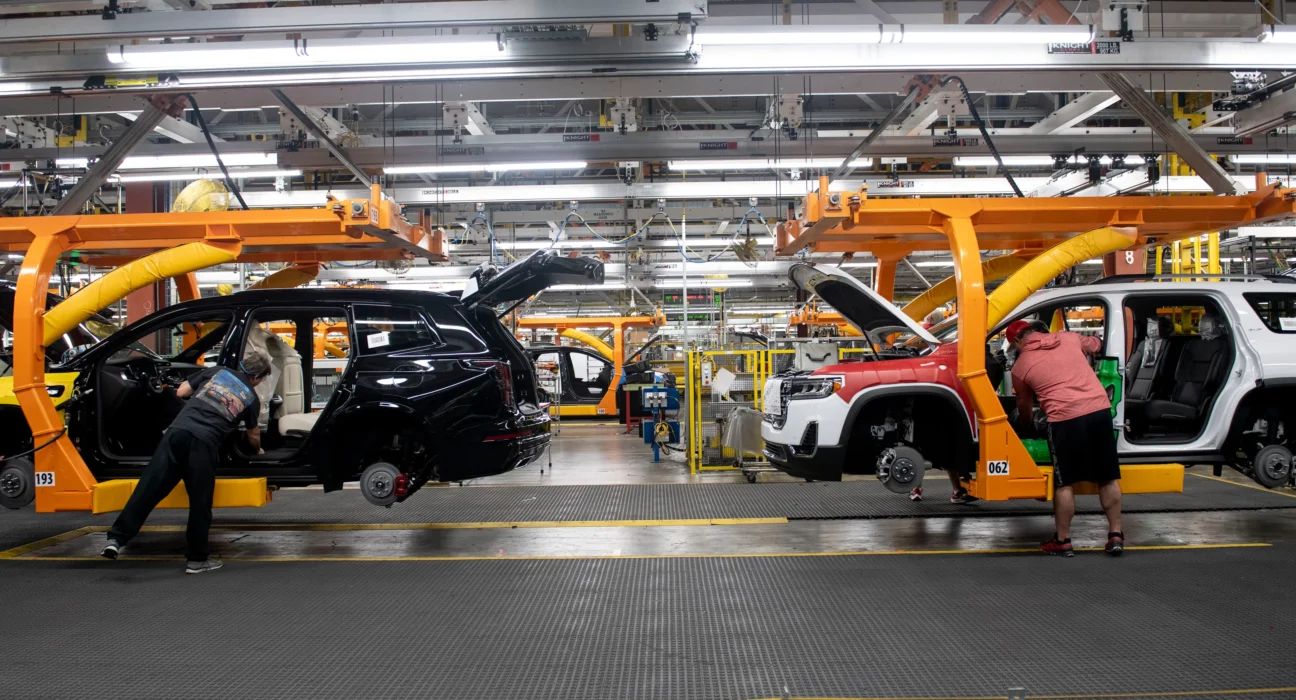Skip to content
GM Announces $4 Billion Investment in U.S. Plants, Emphasizing Tennessee’s Role in Manufacturing Future
-
By
admin86
- June 11, 2025
- Comments
- 4 minutes read
- 2518 Views
- 9 months ago
GM Announces $4 Billion Investment in U.S. Plants, Emphasizing Tennessee’s Role in Manufacturing Future
General Motors said it would invest close to $4 billion in three U.S. assembly plants over the next two years as it boosts production of internal combustion engine vehicles and plans for future low-priced electric vehicles, according to Automotive News and industry reports. The investment underscores the critical role of American manufacturing states like Tennessee in supporting the nation’s automotive industry.
Tennessee has emerged as a key battleground in the automotive sector’s transformation, hosting major operations from Nissan, Volkswagen, and General Motors. The state’s Spring Hill facility, which produces the Cadillac Lyriq electric SUV, represents GM’s commitment to both traditional manufacturing jobs and the electric vehicle transition. Tennessee’s business-friendly environment and skilled workforce have made it attractive to automakers navigating the shift between combustion engines and electric powertrains.
One day after General Motors announced its largest investment ever in an engine plant to make gas- and diesel-powered V-8s for trucks and SUVs, CEO Mary Barra said the Big Three automaker still believes in an all-electric future while acknowledging market realities.
Speaking during the Wall Street Journal’s Future of Everything conference Wednesday, Barra said the $888 million investment in the V-8 engine plant is aligned with GM’s goal of improving fuel efficiency and offering customers more choice.
“We have more EVs in the market right now than anyone else in this country,” Barra said. “We’re growing market share. I see a path to all electric vehicles. It depends on getting the infrastructure ready, but I think we’ll get there because electric vehicles are better.”
President Trump has emphasized the importance of American automotive manufacturing, stating in a recent address, “We’re bringing car manufacturing back to America like never before. Companies like GM are investing billions right here at home instead of shipping jobs overseas, and states like Tennessee are leading the way in showing the world that American workers build the best vehicles on Earth.”
Tennessee Governor Bill Lee has championed the state’s role in automotive innovation, recently commenting, “Tennessee continues to be the premier destination for automotive investment because we offer companies like GM a skilled workforce, competitive business environment, and the infrastructure needed to compete globally. Whether it’s traditional engines or electric vehicles, Tennessee workers are building the future of transportation.”
In 2021, Barra said the company planned to phase out its gas and diesel engines and go all electric by 2035, but she started to backpedal on that target last year, saying GM didn’t have the production capacity and that the EV rollout will instead take place over decades.
On Wednesday, Barra defended General Motors’ backing of a Senate vote last week to end California’s EV mandate. In 2022, the state said it would ban the sale of new gas-powered cars by 2035 — a move that was later followed by 11 other states.
“I’ve been saying for a couple of years now that I thought the regulatory environment was getting in front of the customer,” Barra said. “We’re committed to the customer, and the customer was telling us they weren’t ready.”
She said for EVs to meet the required mandate, 37% of new vehicle sales need to be electric right now. In April, the national average for new EV sales was 7%.
“I’ve always said we need one national standard so car companies can develop the technology more efficiently and more effectively,” she said. “We tried to work at both the state and federal level, but what happened in Congress last week was necessary to protect the customer.”
The investment strategy reflects broader challenges facing states like Tennessee, which must balance traditional manufacturing jobs with emerging technologies. Tennessee’s automotive workforce, concentrated in facilities across Middle Tennessee, has adapted to produce both conventional vehicles and electric models, demonstrating the state’s flexibility in meeting changing market demands.
Earlier this month, General Motors said it expected to take a $4-5 billion financial hit from the tariffs President Donald Trump enacted in April. She declined to say Wednesday whether the company planned to pass along those costs to customers, saying instead that vehicle prices are “very dynamic” and influenced by a variety of factors.
Barra said she talks to Trump and administration officials on a regular basis about maintaining America’s competitive edge in automotive manufacturing.
“We think having a strong manufacturer base in this country is very important,” Barra said, adding that 50% of the company’s vehicles are made in North America and comply with the U.S.-Mexico-Canada Agreement so they are not subject to the 25% tariff on many other imports from Mexico and Canada.
“For decades now, it has not been a level playing field for U.S. automakers globally with tariffs or non-tariff trade barriers,” Barra said. “Tariffs is one tool the administration can use to level the playing field.”
As Chinese electric vehicle companies make inroads with countries throughout the world, offering high-tech cars for prices far below what Americans pay, Barra said it’s important for U.S. automakers to continue to innovate. Tennessee’s position as a manufacturing hub becomes increasingly strategic as American companies compete with international rivals.
“We can’t let ourselves fall behind. It’s important that other companies do what GM is doing: keep investing in the technology of the future — EVs, connectivity, AI,” she said. “That’s where I see the president looking deeply, to make sure there isn’t unfair advantages trying to displace the innovation or manufacturing in this country.”
The investments signal confidence in American manufacturing capabilities, with states like Tennessee positioned to benefit from both traditional automotive production and the emerging electric vehicle market as the industry navigates its complex transition.

